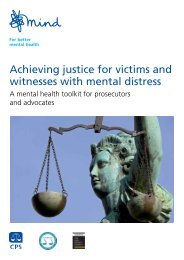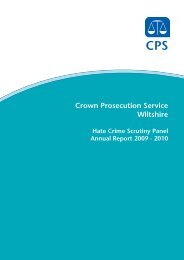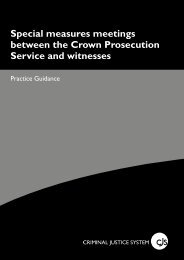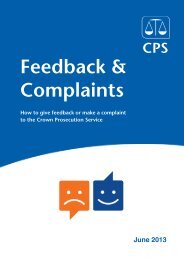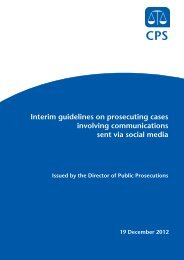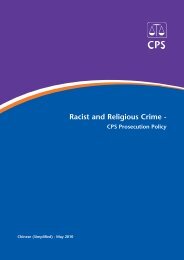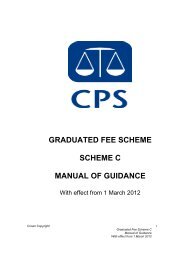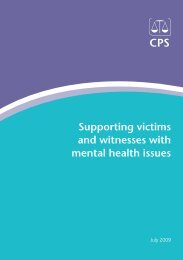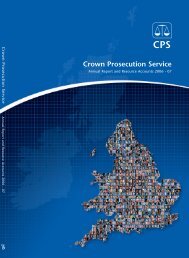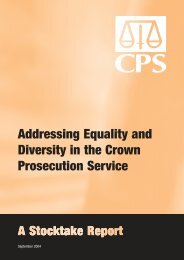CPS Policy on Prosecuting Criminal Cases Involving Children and ...
CPS Policy on Prosecuting Criminal Cases Involving Children and ...
CPS Policy on Prosecuting Criminal Cases Involving Children and ...
Create successful ePaper yourself
Turn your PDF publications into a flip-book with our unique Google optimized e-Paper software.
If defendants are found guilty, courts have the power not <strong>on</strong>ly to punish them, but also tomake orders intended to c<strong>on</strong>trol their behaviour in future.The Code for Crown ProsecutorsWe decide which cases to prosecute by applying two tests that are set out in the Code forCrown Prosecutors; The Code is issued by the Director of Public Prosecuti<strong>on</strong>s, it sets outthe principles to be applied when deciding whether or not an individual should beprosecuted. Both tests must be passed before a case can be prosecuted.Firstly there must be sufficient evidence to provide a realistic prospect of c<strong>on</strong>victi<strong>on</strong> beforethe case can go to court.Before we decide to charge a suspect with an offence, there must be enough evidence sothat magistrates or a jury will be more likely than not to c<strong>on</strong>vict the defendant of what heor she is accused of.Sec<strong>on</strong>dly it must be in the public interest to prosecute. We have to balance the factors for<strong>and</strong> against prosecuti<strong>on</strong> carefully <strong>and</strong> fairly.EvidenceWe will work with the police to build str<strong>on</strong>g cases by collecting good evidence, but we willstop cases where the evidence is not str<strong>on</strong>g enough for the court to find the defendantguilty. We cannot prosecute if there is not enough evidence that can be used in a trial;there are technical legal rules about whether courts will allow evidence to be used. Forexample, evidence that has been obtained unlawfully may be ruled 'inadmissable' by thecourt <strong>and</strong> so cannot be heard.Video statementsPolice officers or social workers who have been trained to work with children can use aspecially equipped room to record <strong>on</strong> video what children under the age of 17 tell them.They usually do this in sexual cases or where there was violence or neglect or a child hasbeen abducted. In other cases it depends <strong>on</strong> a number of factors, including how serious theoffence was <strong>and</strong> how it has affected the child, as well as whether it is likely to improve thequality of the evidence the child can give; Achieving Best Evidence Vol. 1 paragraphs2.26-2.28.They will always try to talk to children in the language of their choice using an interpreter ifnecessary.Parents or carers will not usually be in the room with their children, but they will benearby, unless they themselves are suspects, in case the child becomes upset. The videowill be played in court if there is a trial <strong>and</strong> every<strong>on</strong>e in court will be able to see it. Thedefendant will also see the video, or the statement, before the case comes to court, as wellas <strong>on</strong> the day of the trial.Making a victim pers<strong>on</strong>al statementVictims can make an additi<strong>on</strong>al statement called a victim pers<strong>on</strong>al statement at any stageof the case, but they do not have to make <strong>on</strong>e if they do not want to. It is in additi<strong>on</strong> tothe video or statement about the offence itself.



